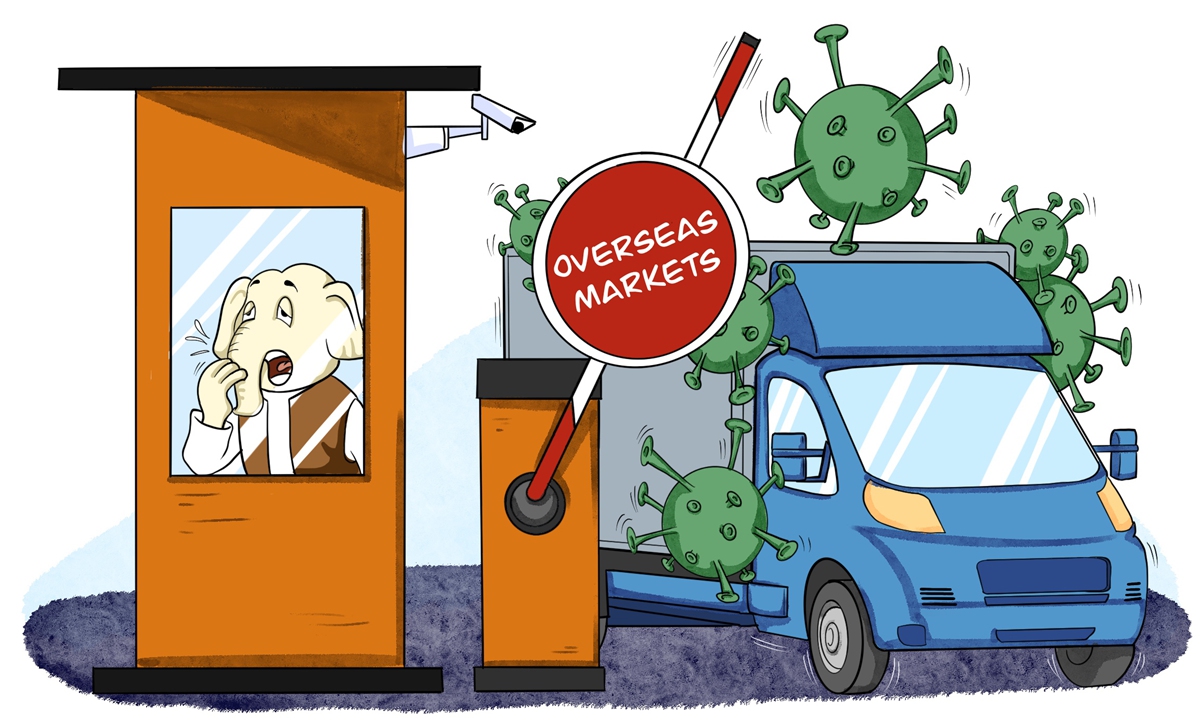-

- Liu Zongyi
- Associate Research Fellow
- Center for Asia-Pacific Studies
- Institute for International Strategic Studies
- A ‘China hand’ from India bears high hopes amid the current stalemate
- India rebalances between US, Russia, but China strategy remains unchanged
- ISRO-OPPO deal benefits India; less hostility is needed
- US efforts to isolate China from solar industry to end in futility
- Time for New Delhi to reconsider its anti-China economic policy

Illustration: Tang Tengfei/GT
The COVID-19 prevention has long been the new normal in China, with residents and different departments remaining on high alert. Yet, the recent new cluster infections in cities of Nanjing and Yangzhou still raised concerns among citizens over the risk of wider spread, especially for the importing risks when some countries have seen resurgence driven mainly by the highly contagious Delta variant.
Some Asian countries have reported surging daily infections. New daily cases in Thailand climbed from about 2,300 in mid June to about 18,000 on Monday. India, though has seen its curve flattened from last national wide outbreak in April-June, is still posting daily new cases of over 40,000.
Under such circumstances, staying highly cautious over cross-border personnel exchange and goods shipment is particularly important. According to Indian media outlets, about 1,000 containers of shrimp were unable to clear the Chinese border after packaging samples being tested positive of coronavirus.
However, the reported normal prevention practices during the pandemic did not raise awareness of Indian officials to enhance inspection and quarantine of exports; instead, it again chose to politicize the trade practice, claiming that China's suspension was lack of "scientific basis", according to the Economic Times in India.
It has been a long-standing attitude taken by India, attempting to stretch trade problems into political issues. As for China, containing the spread of the virus and promoting economic recovery is a hard won and ongoing campaign. With domestic transmission largely under control, the main challenge has been containing import risks from both inbound personnel and goods.
As of the end of June, Chinese customs conducted remote video inspections on 296 overseas food exporters from 60 countries and regions, and suspended import from 144 companies. In the first half of the year, they tested samples of over one million imported cold chain food, animal and plant products, and to return or destroy imported food with risks afterward.
In spite of China's strict inspection protocols, trade between China and India still surged 50.5 percent year-on-year in the first half of the year, in which China's import from India increased 56.8 percent year-on-year, according to data from Chinese customs. China, clearly, is not the side tries to politicize the bilateral trade ties.
It is groundless for some people in India to politicize the reported shrimp issue. And China, in order to protect its citizen's health, will never compromise over taking sound action when it comes to inspecting goods and individuals, not in the early days after the outbreak started last year, not to mention nowadays when Delta variant is bringing about even higher infectious risks.
India, with active infection cases remaining over 400,000, should focus on shoring up its own domestic inspection and quarantine so as to ensure exports are unaffected; otherwise, it may face refusal risks not only from Chinese market.
In fact, Asia is a region recover relatively earlier from the pandemic, whereas is facing mounting pressure amid the current wave of Delta infections. It is expected countries and regions can level up their efforts on both domestic prevention and outbound transportation in order to promote recovery as soon as possible.
China's inspection measures on inbound personnel and products are unlikely to be loosened in light of the current external spreading situation. It takes both sides to ensure safety and keep the growth momentum of the bilateral trade.
The article was compiled by an interview with Liu Zongyi, secretary-general of the Research Center for China-South Asia Cooperation at the Shanghai Institutes for International Studies.
Source of documents:Global Times, Aug 3
